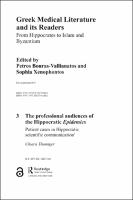Chapter 3 The professional audiences of the Hippocratic Epidemics
Proposal review
Patient cases in Hippocratic scientific communication
| dc.contributor.author | Thumiger, Chiara | |
| dc.date.accessioned | 2019-10-18 14:19:37 | |
| dc.date.accessioned | 2020-04-01T13:03:34Z | |
| dc.date.accessioned | 2018-02-26 23:55 | |
| dc.date.accessioned | 2019-10-18 14:19:37 | |
| dc.date.accessioned | 2020-04-01T13:03:34Z | |
| dc.date.accessioned | 2018-01-01 23:55:55 | |
| dc.date.accessioned | 2019-10-18 14:19:37 | |
| dc.date.accessioned | 2020-04-01T13:03:34Z | |
| dc.date.available | 2020-04-01T13:03:34Z | |
| dc.date.issued | 2018 | |
| dc.identifier | 644572 | |
| dc.identifier | OCN: 1030819462 | en_US |
| dc.identifier.uri | http://library.oapen.org/handle/20.500.12657/30635 | |
| dc.description.abstract | To summarise our findings, the Hippocratic Epidemics case reports is an example of a text whose intended audiences, despite the ambiguities and historical uncertainties about the texts’ composition and transmission, were very firmly delimited as professional and medical. Such closure defines this phase of ancient medicine as particularly territorial and “technical”, on the one hand – no literary pretence, nor broader intellectual appeal of the kind shown by Galen is on the horizon of these writers, nor any explicit attempt to win over lay audiences, at least in the Epidemics.77 Also, it tells us something about the epistemology and didactics at work in the Hippocratic handling of patients, which we can summarise as follows: non-theoretical, observation-based and data-centred; self-standing, i.e. not relying on a system of knowledge or a “syllabus” (compare Galen’s frequent recommendation on which of his books one should read first, which are for beginners, what should follow, etc.), but needing to “support itself” by insuring the memorisation of the repertoires of observations, procedures, risks and mistakes; lack of a synthesis of the empirical data, such as a form of diagnosis, or of the “epistemological extension” that might turn the observed case into an “experiment”.78 The Hippocratic use of individual evidence – the patient case – remained in this early stage a communication of pure data. Individual memory, in conclusion, the reception of an individual intellect – a future student, a training doctor – characterises the audience of these texts, motivates and even determines, concretely, their very existence. | |
| dc.language | English | |
| dc.subject.classification | thema EDItEUR::M Medicine and Nursing | en_US |
| dc.subject.other | patient cases | |
| dc.subject.other | hippocratic | |
| dc.subject.other | communication | |
| dc.subject.other | patient cases | |
| dc.subject.other | hippocratic | |
| dc.subject.other | communication | |
| dc.subject.other | Case report | |
| dc.subject.other | Epidemic | |
| dc.subject.other | Epistemology | |
| dc.subject.other | Galen | |
| dc.subject.other | History of medicine | |
| dc.subject.other | Medicine | |
| dc.subject.other | Mnemonic | |
| dc.subject.other | Physician | |
| dc.title | Chapter 3 The professional audiences of the Hippocratic Epidemics | |
| dc.title.alternative | Patient cases in Hippocratic scientific communication | |
| dc.type | chapter | |
| oapen.relation.isPublishedBy | 7b3c7b10-5b1e-40b3-860e-c6dd5197f0bb | |
| oapen.relation.isPartOfBook | d6ec0982-bde9-4dab-a0d0-576f20934bc9 | |
| oapen.relation.isFundedBy | d859fbd3-d884-4090-a0ec-baf821c9abfd | |
| oapen.relation.isbn | 9781351205276 | |
| oapen.collection | Wellcome | |
| oapen.imprint | Routledge | |
| oapen.pages | 19 | |
| oapen.chapternumber | 1 | |
| oapen.remark.public | Relevant Wikipedia pages: Case report - https://en.wikipedia.org/wiki/Case_report; Epidemic - https://en.wikipedia.org/wiki/Epidemic; Epistemology - https://en.wikipedia.org/wiki/Epistemology; Galen - https://en.wikipedia.org/wiki/Galen; Hippocrates - https://en.wikipedia.org/wiki/Hippocrates; History of medicine - https://en.wikipedia.org/wiki/History_of_medicine; Medicine - https://en.wikipedia.org/wiki/Medicine; Mnemonic - https://en.wikipedia.org/wiki/Mnemonic; Physician - https://en.wikipedia.org/wiki/Physician | |
| oapen.remark.public | 3-8-2020 - No DOI registered in CrossRef for ISBN 9781472487919 | |
| oapen.identifier.ocn | 1030819462 | |
| peerreview.anonymity | Single-anonymised | |
| peerreview.id | bc80075c-96cc-4740-a9f3-a234bc2598f1 | |
| peerreview.open.review | No | |
| peerreview.publish.responsibility | Publisher | |
| peerreview.review.stage | Pre-publication | |
| peerreview.review.type | Proposal | |
| peerreview.reviewer.type | Internal editor | |
| peerreview.reviewer.type | External peer reviewer | |
| peerreview.title | Proposal review | |
| oapen.review.comments | Taylor & Francis open access titles are reviewed as a minimum at proposal stage by at least two external peer reviewers and an internal editor (additional reviews may be sought and additional content reviewed as required). |

